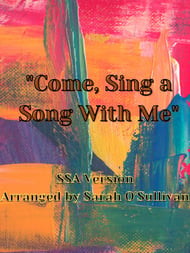
Come, Sing a Song With Me
Publisher Desc.
Come, Sing a Song With Me
Notes From the Arranger
Hello, and thank you for your interest in this SSA version of the
traditional Unitarian hymn, Come, Sing a Song With Me.
My goal in arranging this was to put an American song into a multicultural
context, rather than hijack and arrange a traditional song from another
culture.
To that end, three verses of the song are in languages other than English.
I chose languages that are important to the United States: Lenape, which
represents the people native to this land; Swahili, representing people who
were brought here against their will; and Spanish, to represent the many
people who have come here seeking a happier and safer life.
Sadly, many Native American languages have been lost, so I am deeply
grateful to the New Jersey Sand Hill Band of Lenape and Cherokee Indians for
their help with the translation and pronunciation of the second verse.
Pal, wichei lashimwi, nteli wahan kte roughly translates to Come, dream
a dream with me, that I might know your mind.
It is pronounced, Pahl, wee-CHEI la-SHEEM-wee, nDEL-ee wa-HAN
k-TEI.
Words ending with ei sound somewhere between ay and eh. For examples
of pronunciation, visit https://www.talk-lenape.org.
The third verse, Njoo, pamoja na mvua, ili nipate kukujua, roughly
translates to, Come, walk in rain with me, that I might know your mind. The
original languages of African slaves who were forceably brought to the United
States have also mainly changed or been lost, so I chose Swahili because it
is derived from older languages and is currently the most commonly spoken
African tongue.
The line is pronounced, Njoa, pah-moh-ja mVOO-ah, i-li ni-PAH-teh
ku-ku-JU-ah.
The first word is tricky to write out; it sounds similar to the English
word jaw, but an oh sound comes before the aw.
The last verse loosely translates to Come, share a rose with me, that I
might know your mind. (With all the translations, I had to do my best to
make the words fit the music and the meaning, so they are not exact.)
The Spanish line is: Ven, comparte una rosa con me, para que conozca tu
mente.
It is pronounced: Ven, cohm-PAR-te U-na ROH-za cohn meh, para kei
coh-NOH-scah tu MEN-teh.
For all of these pronunciations, finding a native speaker is the best
option, if possible; I cannot adequately write out all the inflections and
vowels.
I hope you enjoy the song.
Your humble servant,
Sarah OSullivan
Select a Product
My Library













